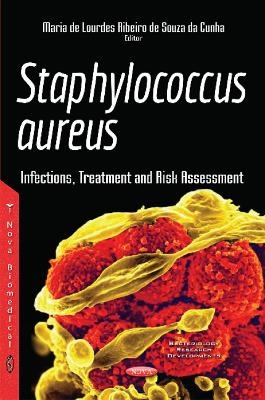
Staphylococcus aureus
Nova Science Publishers Inc (Verlag)
978-1-63485-959-2 (ISBN)
Maria de Lourdes Ribeiro de Souza da Cunha, MD in Science and Technology of the Food (1992), PhD in Tropical Diseases (1998); is biologist with main research interests in Microbiology, focusing on Bacteriology, acting on the following subjects: Staphylococcus aureus, Coagulase-Negative Staphylococci (CoNS), epidemiology, virulence factors, biofilms, enterotoxins and antimicrobial resistance. She is professor and researcher at the Department of Microbiology and Immunology of the Bioscience Institute, Sao Paulo State University (UNESP), Botucatu, SP, Brazil; Scholarship in Research Productivity of the National Council for Scientific and Technological Development (CNPq), an agency linked to the Ministry of Science and Tecnology (MCT), dedicated to the promotion of scientific and technological research and to the formation of human resources for research in the Brazil. Professor and mentor master's, doctoral and postdoctoral studies at the graduate program in Tropical Diseases, Faculty of Medicine of Botucatu and the Post-graduation in General Biology and Applied, Biosciences Institute, UNESP, Botucatu, SP, Brazil. She is involved in research projects as a scientific reference in Staphylococcus supported for the Sao Paulo Research Foundation FAPESP public foundation with the mission to foster research and the scientific and technological development of the State of Sao Paulo, Brazil. She is the author of more than 80 papers in international peer reviewed journals and b
Preface; MRSA Among Burn Patients: Relevance, Epidemiology & Control; Community-Associated Staphylococcus aureus (CA-MRSA) in Special Groups; Molecular Epidemiology of Livestock-Associated Methicillin-Resistant Staphylococcus aureus (LA-MRSA); Epidemiology of Highly Adaptable Clones: ST398 & Human Diseases; Staphylococcus spp. in Bloodstream Infections; Staphylococcus aureus Infections in Newborns; Staphylococcus spp. in the Etiology of Peritonitis in Peritoneal Dialysis: Risk Factors of the Host & Micro-Organism; Staphylococcus aureus: Superantigens & Autoimmunity; Index.
| Erscheinungsdatum | 03.12.2016 |
|---|---|
| Verlagsort | New York |
| Sprache | englisch |
| Maße | 155 x 230 mm |
| Gewicht | 232 g |
| Themenwelt | Studium ► Querschnittsbereiche ► Infektiologie / Immunologie |
| ISBN-10 | 1-63485-959-6 / 1634859596 |
| ISBN-13 | 978-1-63485-959-2 / 9781634859592 |
| Zustand | Neuware |
| Haben Sie eine Frage zum Produkt? |
aus dem Bereich


